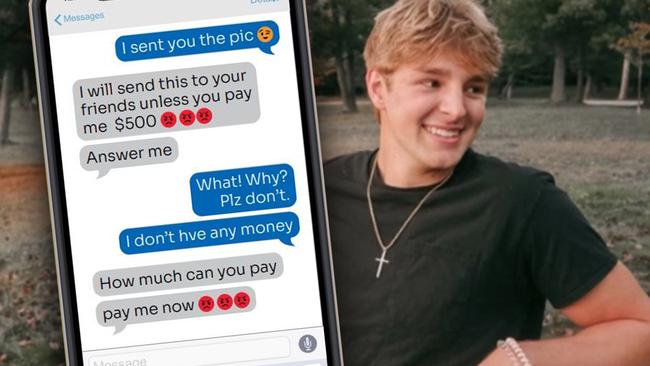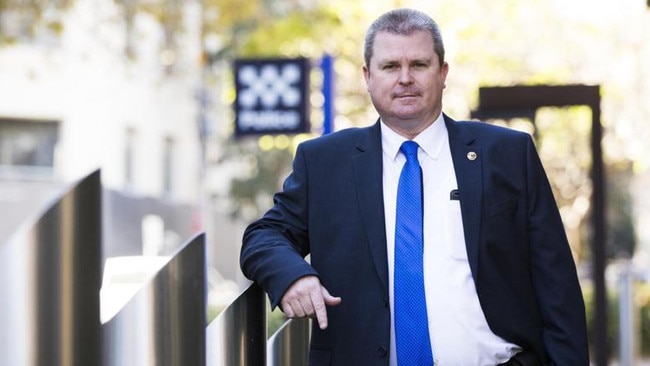Young males being targeted by sophisticated international sextortion scams are on the rise
There has been a sharp rise in the rate of sextortion scams targeting NSW males with police revealing boys aged between 14 and 19 are at the most risk.
Police & Courts
Don't miss out on the headlines from Police & Courts. Followed categories will be added to My News.
Young boys have become the prime target of a sophisticated group of criminals coaxing them into sending nude and sexual pictures then using the images for a cruel game of humiliating blackmail.
NSW Police have noticed a sharp rise in the rate of “sextortion” in the past 12 months, revealing boys aged 14 to 19 are at the most risk.
Of most concern is the fact the shame of being a victim of such a crime mean the teens are too afraid to come forward and in worst cases can lead to self harm and suicide.
NSW Police Cyber Crime Squad boss Matt Craft said police want teenagers being duped by overseas-based criminals posing as attractive, flirty strangers to know they won’t be judged if they come forward.
“They feel shame and embarrassment but they need to understand that they are a victim, just like they would be considered a victim if they were assaulted or had their bike stolen,” Detective Superintendent Craft exclusively told the Saturday Telegraph.

“We are first and foremost concerned with getting their support; we are on their side, they are victims of crime.”
Detective Superintendent Craft said parents – who would never have experienced sextortion growing up – needed to be aware of this “new-age” crime happening under their noses and having devastating effects on children across all demographics and socio-economic backgrounds.
The playbook goes like this: Someone posing as an attractive male or female, usually female, will befriend a potential victim on any one of the social media platforms.
There will be a “friendly online exchange” that will progress to a sexualised conversation “testing” to see if that victim is prepared to engage,” the cyber crime boss said.
“If they engage then that’s when the criminal knows they have someone on the hook. They will always send images first, maybe a dozen images and even a video.
“What they are trying to do is manipulate their victim into believing they are in a safe space, the other person has done it first, so they can feel obliged to send an image in return.
“The minute they press send the tone changes and the demand for money follows.”
Depending on how much information the victim has given about themselves, the more they will feel trapped.

“It’s sophisticated, they follow a script, they know what nerves to hit and cajole the young person into a false sense of security,” Detective Superintendent Craft said.
The more the victim has let the criminal infiltrate their social media – by friend requesting on Facebook, or following on Instagram, SnapChat and countless others – the more access they have to their school community, friend groups, and the more frightening the threat becomes to be exposed.
The criminals are usually posing as attractive, scantily dressed people and often have mistakes in their grammar and spelling.
“If a 16-year-old boy is getting nude pics from a 20-year-old woman that should be a trigger,”
Detective Superintendent Craft said.
While young boys and girls were extremely vulnerable, the criminals were having success across all demographics “all the way to multi million dollar business people”.
And while more than 1000 people reported being a victim of intimate image abuse in the last financial year the major concern was the amount of cases that go unreported.
In the 2021-22 period the rate jumped 24 per cent from the previous year then police recorded another 15 per cent jump last financial year.
Superintendent Craft said young boys exploring their own sexuality were at great risk.
“That’s because there can be more shame for them if they haven’t come out to their family, that’s an extra layer for that child to deal with.”
The crooks were smart, asking for only amounts of money they believed their victims could afford.
“They don’t ask for large sums of money, they know kids can’t access hundreds of thousands of dollars, so they go for amounts they know are achievable.”
“Just recently a boy who hadn’t come out tricked into performing sexual acts recorded and he was extorted. He felt alone, he didn’t feel comfortable talking to his parents but thankfully he had remembered something he had seen at school relating to sextortion and he reported it.”

Detective Superintendent Craft said NSW Police were firmly committed to stopping these organised criminals from preying on young people, working closely with other law enforcement agencies including the AFP and US authorities including the FBI who had recently carried out a sting in Nigeria, extraditing alleged offenders involved. In some of those cases the victims had committed suicide.
In a recent case two Nigerian men were extradited to the US to face charges in a sexual extortion scheme that authorities say prompted the suicide last year of a 17-year-old Michigan high school student Jordan DeMay.
Samuel Ogoshi, 22, and his younger brother Samson Ogoshi, 20, of Lagos, were flown to the US and are facing charges.
“We want parents to have conversations with children,” Detective Superintendent Craft said.
“We want mum and dad to read the paper and walk into the bedroom of their young son or daughter and say ‘what would you do if someone asked you to send a nude pic to people they don’t know and can’t identify.
“To talk to them and remind them that just because someone sends them a number or an email address purporting to be a friend you shouldn’t be sending pictures if you can’t trust it’s that particular person.
“That’s a conversation that can change lives.”
Got a news tip? Email weekendtele@news.com.au





